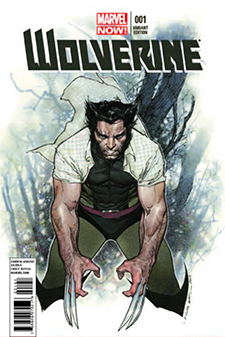This one's been a long time coming. Long enough, in fact, that both Nova and Guardians of the Galaxy have already seen second issues (and we'll get to those). Soon I'll be running a sort-of Marvel NOW report card, revealing which titles I gave up on, which ones I went back and re-visited, which ones are really great underdogs, and which ones actually improved over time (hint: Superior Spider-Man). I didn't expect Marvel to keep up the new title announcements for Marvel NOW, but they're doing ongoings for Spider-Man's villains and the robot members of the Avengers, so maybe this column will keep going for all-time. Maybe not. Anyway, onward and upward...
Guardians of the Galaxy #0.1
This issue is constructed to introduce readers to the captain of the Guardians team, Peter Quill aka Star-Lord. It's a simple story, and you don't get a good feel for Quill's personality - only where he came from. In this case, where he came from is a deadbeat dad who also happens to be intergalactic royalty, making a pit stop on Earth and bedding an Earthling against his better judgment. Quill grows up aware of his heritage, but raised longing to know more about his father and the stars.
Frankly, I don't remember this being Star-Lord's origin. I have vague recollections of a cocky astronaut who manipulated his way into receiving the mantle of a Star-Lord, but maybe that was from a reprint of one of Marvel's old magazines. I don't know if those are in-continuity anyway.
Writer Brian Michael Bendis is carrying a lot of the Marvel Universe on his shoulders (Ultimate Comics Spider-Man, All-New X-Men, Uncanny X-Men, and this year's big event Age of Ultron), and this series feels a little like he's giving himself a bit of a break. It doesn't hint at the long-term planning of the X-books, nor does it get as particular with characterization as Ultimate Spidey does. It's lighter, and the lightness continues into the first official issue, one which sees Quill as a grown man, caught between defending the Earth and honoring the requests of his scheming dad. Steve McNiven complements Bendis's plotting with clean, effectively modern art that's pleasing to look at and accessible to all.
Will I Be Back for More? After two issues, I'm on the fence. I want to keep reading, because I'm interested in the team and how important they are to Marvel's cinematic plan, but this doesn't quite feel like a team book (yet?). It feels like a Peter Quill book with his Very Special Guest Stars Iron Man and Rocket Raccoon. I'll give this one a few more before I decide. Bendis doesn't seem to be swinging for the fences, and I think I expected him to, considering how all eyes are on this book right now.
Nova #1
Didn't I just get done describing an origin issue in which a kid grows up without a decent father figure because Dad has ties to some larger cosmic adventure? In this one, it's not Peter Quill; it's Sam Alexander - an all-new character created by Jeph Loeb, replacing fan favorite and former New Warriors stalwart Richard Ryder as Nova. The set-up has Sam wondering just how much truth is in his father's stories of exclusive membership in a space-faring group known as the Nova Corp (Marvel's answer to DC's Green Lanterns, no doubt about it). There's a lot of Teen Superhero 101 in here, with Sam getting picked on by bullies, riding a skateboard, and drawing the attention of the school's alt-girl outcast (which comic books almost always predictably depict as a sassy bookworm with funky colored hair and fishnet stockings).
Loeb's real hit and miss as a writer. Other fans really have it out for the guy, but I've missed some of his real stinkers (Ultimatum) and enjoyed a lot of his stuff over the years (Spider-Man: Blue comes to mind, as does Superman: For All Seasons). At his worst, when his comics aim for "fun," they sometimes feel as if they're talking down to the reader, and I think some fans react negatively to that. That kind of thing is more evident in Nova #2, a comic that's so decompressed it's basically just Sam putting on the Nova helmet and discovering he can fly. It's a bit like slapping a $2.99 price tag on the montage scene in any given superhero origin film where the hero tests his powers. That's not really a story.
I realize Loeb is aiming a little younger here, and I appreciate Marvel NOW having something that's aimed at that audience, but a kid should get a full story for his dollars, not just a part of a story. Loeb is off the book after this set-up arc (due to a full plate with Marvel's TV properties), so maybe the next writer, Zeb Wells, will squeeze in more bang for the buck. Even Ed McGuinness, so good at drawing oversized heroes, feels restrained here. Not that the art is bad (it isn't), but that it's a minimal effort artistically. It doesn't wow in the way that McGuiness can wow. I'd chalk it up to him trying to work in a style that he can actually consistently produce on a monthly basis, but he's leaving the book as well soon, with Paco Medina batting clean-up.
Will I Be Back for More? I'll give it another go when Wells and Medina take a crack at Sam. He's a likable hero with a cool costume, but this isn't a must-read right now. Again, if you're a parent, this is one of Marvel's more "safe" books while still not being too kiddie, so keep that in mind if you've got a little one around who digs the superheroes.
Wolverine #1
Wolverine is an odd duck. I don't think Wolverine's solo book has ever felt quite like a straight-forward superhero book; it's always had its own specifically Wolverine flavor. It's a little dirtier, a little meaner, and it typically feels slightly removed from the Marvel U. Paul Cornell and Alan Davis saddle Wolverine with an unusually clean-cut superheroic vibe, with the title character assisting police and flashing his Avengers badge when necessary.
I gripe a lot about books where nothing much seems to happen, and Wolverine is one of those, but...there's something at work here. I was intrigued, even while I was disappointed that the first issue isn't a tale with a beginning, middle, and end. It's a set-up where not even all of the pieces of the set-up are fully fleshed-out. The story begins with Wolverine's healing factor allowing him to take down a mass-murderer at a shopping mall (told you it's a more mundane Wolvie - what's he doing shopping at the mall?) and then getting mixed up in uncovering the motivations for the killings (the killer was using a very high-tech, sci-fi weapon, not your standard assault rifle).
Will I Be Back for More? I'm going to give this one another issue, but I can't strongly recommend it at this point. Wolverine #1 isn't going to appease the more bloodthirsty Wolverine fans, and it's probably too far removed from the X-Men to rope in the X-fans. I've been pretty good about pinpointing where certain comics' appeal lies with me, and honestly can't get a decent grasp on what it was I liked about Wolverine #1 other than the overall New York City superhero vibe. That's a terrible recommendation, but I can't muster up anything stronger than that.




